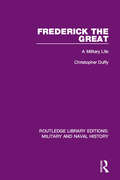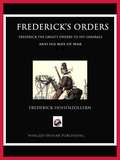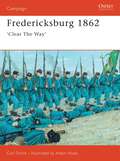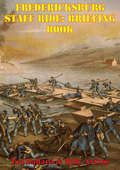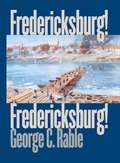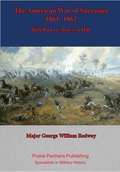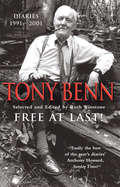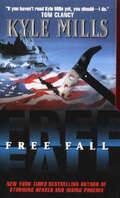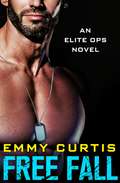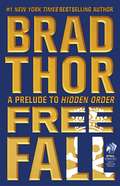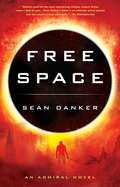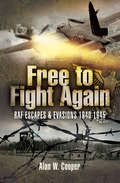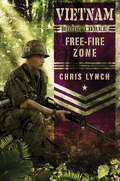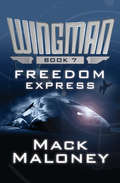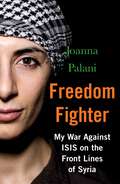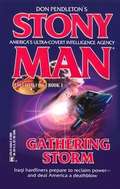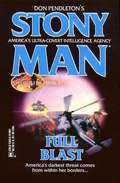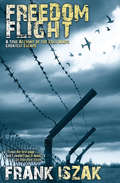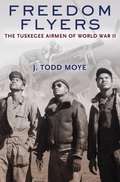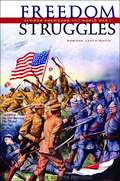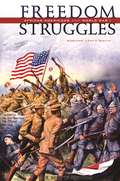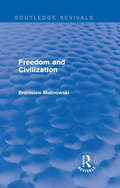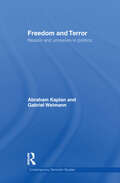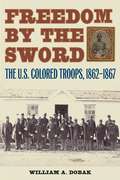- Table View
- List View
Frederick the Great: A Military Life (Routledge Library Editions: Military and Naval History)
by Christopher DuffyFor tactical and strategic ingenuity, for daring and ruthless determination and the capacity to inspire troops, Frederick the Great was without equal. In this detailed life of ‘Old Fritz’, Christopher Duffy, who has written widely on the army of Frederick and on the armies of his adversaries, Austria and Russia, has produced a definitive account of his military genius.
Frederick's Orders: Frederick the Great's Orders to His Generals and His Way of War
by Vincent W Rospond Frederick HohenzollernAt various times in his military career Frederick the Great seemed on the cusp of a major defeat, yet always to find ways to extricate himself a secure a victory for himself and his lands. Frederick has long been considered in the pantheon of military leaders for his strategic and tactical prowess. His instructions to his generals have long been considered a starting point to understand the military mind of this leader. We present an annotated and illustrated version of Frederick the Great's 1754 Instructions to his infantry and cavalry. Included in this volume are maps that provide a background to his battles, a biography of Frederick and some of his generals, and an explanation of 18th century warfare as well as illustrations of his troops.
Fredericksburg 1862
by Carl Smith Adam HookOsprey's examination of the Battle of Fredericksburg of the American Civil War (1861-1865). In December 1862, things were still confused for the Union. Antietam had been a failure for both sides, and although the battle showed that the Union army could bring the Confederates to bay, it couldn't pin them in one place long enough to destroy them. In December 1862, General Burnside, newly appointed to command the Army of the Potomac, planned to seize and secure the town of Fredericksburg, and then take the Confederate capital of Richmond. Carl Smith's book details the epic struggle that engulfed the Union side as it crossed the Rappahannock on December 11, encountering stiff opposition from Lee's men.
Fredericksburg Staff Ride: Briefing Book [Illustrated Edition]
by Ted Ballard Billy ArthurContains more than 20 maps, diagrams and illustrationsThe movement and details of the Union offensive plan at Fredericksburg seemed to be understood by all senior commanders; the North had a preponderance of manpower and artillery; a bridgehead was established on the enemy side of the river and initial objectives secured. Why did Burnside decide to withdraw his army back across the river to its original position? That question cannot be answered without viewing the pontoon crossing sites, the Union approach routes, the infamous "stonewall," and the other Confederate defensive positions. Accordingly, the purpose of a Fredericksburg staff ride is to visit these and other locations on the battlefield and analyze the battle through the eyes of the men who were there, both leaders and rank and file soldiers.
Fredericksburg! Fredericksburg!
by George C. RableDuring the battle of Gettysburg, as Union troops along Cemetery Ridge rebuffed Pickett's Charge, they were heard to shout, "Give them Fredericksburg!" Their cries reverberated from a clash that, although fought some six months earlier, clearly loomed large in the minds of Civil War soldiers. Fought on December 13, 1862, the battle of Fredericksburg ended in a stunning defeat for the Union. Confederate general Robert E. Lee suffered roughly 5,000 casualties but inflicted more than twice that many losses--nearly 13,000--on his opponent, General Ambrose Burnside. As news of the Union loss traveled north, it spread a wave of public despair that extended all the way to President Lincoln. In the beleaguered Confederacy, the southern victory bolstered flagging hopes, as Lee and his men began to take on an aura of invincibility. George Rable offers a gripping account of the battle of Fredericksburg and places the campaign within its broader political, social, and military context. Blending battlefield and home front history, he not only addresses questions of strategy and tactics but also explores material conditions in camp, the rhythms and disruptions of military life, and the enduring effects of the carnage on survivors--both civilian and military--on both sides.
Fredericksburg, 1862: A Study Of War [illustrated Edition] (Special Campaigns Series #3)
by Major George William RedwayThis ebook is purpose built and is proof-read and re-type set from the original to provide an outstanding experience of reflowing text for an ebook reader. Includes Civil War Map and Illustrations Pack - 224 battle plans, campaign maps, and detailed analyses of actions spanning the entire period of hostilities. Major Redway picks up his analysis of the actions in the Eastern theatre of the Civil War with his widely acclaimed book on the Fredericksburg campaign of 1862. Goaded by his political master Lincoln, Major-General Burnside assumed the offensive with the Union army in late 1862, planning to use speed and surprise to enable him to defeat the Confederate forces under Robert E. Lee. His plan started to fall apart almost immediately as he failed to move with the requisite speed and, faced with choices between vaciliation and bold action, assumed the former. What had started badly was to end disastrously for the Union forces at the Battle of Fredericksburg, as bloody frontal assaults were delivered against entrenched Confederate troops. This book is part of the Special Campaigns series produced around the turn of the 20th century by serving or recently retired British and Indian Army officers. They were intended principally for use by British officers seeking a wider knowledge of military history. Title - Fredericksburg, 1862 : A Study of War Series Name - Special Campaigns Series Series Number --3 Author -- Major George William Redway (1859-1934) Text taken, whole and complete, from the edition published in 1906, London, by Swan Sonnenschein & Co. Original - xv and 297 pages. Illustrations - The maps cannot be reproduced with this volume as they are A3 - 224 additional maps have been added.
Free At Last: Diaries 1991 - 2001
by Tony BennTony Benn is the longest serving MP in the history of the Labour Party. He left Parliament in 2001, after more than half a century in the House of Commons, to devote more time to politics. This volume of his Diaries describes and comments, in a refreshing and honest way, upon the events of a momentous decade including two world wars, a change of government in Britain and the emergence of New Labour, of which he makes clear he is not a member. Tony Benn's account is a well documented, formidable and principled critique of the New Labour Project, full of drama, opinion, humour, anecdotes and sparkling pen-portraits of politicians on both sides of the political divide. But his narrative is also broader and more revealing about day-to-day political life, covering many aspects normally disregarded by historians and lobby correspondents, relating to his work in the constituency, including his advice surgeries. This volume also offers far more of an insight into Tony Benn's personal life, his thoughts about the future and his relationship with his family, especially his remarkable wife Caroline, whose illness and death overshadow these years. Tony Benn is a unique figure on the British political landscape: a true democrat, a passionate socialist and diarist without equal. With this volume, his published Diaries cover British politics for over sixty years. It is edited, as are all others, by Ruth Winstone.
Free Fall
by Kyle MillsFrom the #1 New York Times bestselling author of Vince Flynn's Mitch Rapp SeriesIt's bold. It's dangerous. It's the kind of maverick operation that has made Mark Beamon both the FBI's best agent and its least-likely-to-succeed screw-up.A top-secret FBI file -- buried in an anonymous government warehouse since J. Edgar Hoover's death -- is missing. The unlucky grad student who uncovered it is dead, and now his ex-girlfriend is on the run, accused of the murder. The only man everyone agrees can find the young woman and turn up the explosive document is "off-duty," suspended and under the threat of prosecution by the bureau itself.Beamon knows better than anyone that this is his last shot to save his career -- and his country. Tracking the young woman down, though, will be the hardest assignment he's ever tackled, for she's a gutsy world-class rock-climber who can drop out of sight anywhere in the world. And even if he finds her and the file, who can he trust when the FBI itself is under suspicion? Beamon has no room for wrong guesses -- or moves. If he blows this one, he'll free fall straight out of the bureau -- and straight into prison....
Free Fall (Elite Ops #3)
by Emmy CurtisFrom the author of the Alpha Ops series comes an action-packed, super sexy military romance. A legend among black ops teams, Col. Duke Cameron can't wait to get back in action again--no matter how high the risk. Two of the world's best military pilots are missing after a midair collision, and he's made it his job to find out why.U.S. Air Force veteran Casey Jacobs loves working for a cutting-edge, high-tech company - until she suspects their newest design might have caused a horrible plane crash. But after a few "accidents," it's clear no one wants her asking too many questions. The only person she trusts to help her is Duke, the sexy secret crush from her flying days who still turns her on like no one ever has.But someone is watching their every move, making sure they don't uncover the truth. And when the danger turns physical, it's not just their love that's on the line. It's their lives."Dangerous secrets and undeniable chemistry are the hallmarks of Curtis's steamy third Elite Ops contemporary military romantic thriller." -Publishers Weekly "Very thrilling, with lots of action and lots of sex. Recommend for those who read Julie Walker." -Library Journal
Free Fall: A Prelude to Hidden Order (The Scot Harvath Series #12)
by Brad ThorThe prelude to Hidden Order, Brad Thor's riveting and pulse-pounding Scot Harvath thriller.Experience the suspense and thrills only Brad Thor can write in Free Fall, the shocking prelude to Hidden Order.
Free Space
by Sean DankerIn the follow-up to Admiral, the intergalactic war has ended and hostilities between the Evagardian Empire and the Commonwealth are officially over, but the admiral is far from safe. . . .I’d impersonated a prince, temporarily stopped a war, escaped a deadly planet, and survived more assassination attempts than I could conveniently count. After all that, there shouldn’t have been anything simpler than a nice weekend with a charming Evagardian girl. However, some corners of the galaxy aren’t as genteel as the Empire, and Evagardians aren’t universally loved, which is how I ended up kidnapped to be traded as a commodity.Their timing couldn’t have been worse. I'm not at my best, but these people have no idea whom they're dealing with: a highly trained, genetically engineered soldier in the Imperial Service who happens to be my date.From the Trade Paperback edition.
Free Trade and Sailors' Rights in the War of 1812
by Paul A. GiljeOn July 2, 1812, Captain David Porter raised a banner on the USS Essex proclaiming "A free trade and sailors rights," thus creating a political slogan that explained the War of 1812. Free trade demanded the protection of American commerce, while sailors' rights insisted that the British end the impressment of seamen from American ships. Repeated for decades in Congress and in taverns, the slogan reminds us today that our second war with Great Britain was not a mistake. It was a contest for the ideals of the American Revolution bringing together both the high culture of the Enlightenment to establish a new political economy and the low culture of the common folk to assert the equality of humankind. Understanding the War of 1812 and the motto that came to explain it - free trade and sailors' rights - allows us to better comprehend the origins of the American nation.
Free to Fight Again: RAF Escapes and Evasions, 1940–1945
by Alan W. CooperTo survive baling out from a doomed aircraft or a crash-landing in enemy occupied territory certainly required a large element of luck. To then manage to return to Allied shores inevitably needed considerably more good fortune and often the assistance of local patriots and resistance workers. This book contains the amazing stories of over seventy such escapes, many first-hand accounts. It includes aircrew who found their way to freedom from Europe and places as far away as the Bay of Bengal. There are stories of hi-jacked aircraft, crossing crocodile infested swamps, evasion by camel and coffin, survival in the jungle and brushes with the Gestapo.
Free-Fire Zone: Free-Fire Zone (Vietnam #3)
by Chris LynchFour best friends. Four ways to serve their country.Morris, Rudi, Ivan, and Beck are best friends for life. So when one of the teens is drafted into the Vietnam War, the others sign up, too. Although they each serve in a different branch, they are fighting the war together -- and they promise to do all they can to come home together.Rudi is perhaps the most concerned about whether or not he'll be able to keep that promise. After all -- and he'd be the first to admit this -- he's not the most capable guy. He's not smart like Beck, or brave like Ivan. He lacks the strength of Morris's moral convictions.But once Rudi is pulled kicking and screaming into the Marines, he at last finds something he's good at: following orders. Will that be enough to keep him alive? And if he does survive the war, will his best friends even recognize him on the other side?
Freedom Express: Freedom Express (Wingman #7)
by Mack MaloneyTo reclaim the American Badlands from Soviet invasion, fighter pilot Hunter Hawk trades in his F-16 for a battle-ready locomotive. World War III ended with a Soviet nuclear attack that shattered the United States into fragments. Led by Major Hawk Hunter, what remained of the country&’s armed forces fought off the Red Army invasion, and they have spent years rebuilding their fragmented nation. Only one territory was left deserted: the Southwest, now known as the Badlands. In order to reestablish the overland route between the eastern and western regions, a train of modern pioneers is sent across the desert. The train makes it safely, but when it arrives in Los Angeles, every passenger on board has vanished. To bring the fight to the bandits, Hunter designs his own train—a super-fortress on rails that will make the country safe again. But the new Wild West is no place for a lawman, and Hunter will need more than a six-gun to survive. Freedom Express is the seventh book of the Wingman series, which also includes Wingman and The Circle War.
Freedom Fighter: My War Against ISIS on the Frontlines of Syria
by Joanna PalaniJoanna Palani made headlines across the world when her role fighting ISIS in the Syrian conflict was revealed. Inspired by the Arab Spring, Joanna left behind her student life in Copenhagen and traveled to the Middle East in order to join the YPJ—the all-female brigade of the Kurdish militia in Syria. After undergoing considerable military training, including as a saboteur and sniper, Joanna served as a YPJ fighter over several years and took part in the brutal siege of Kobani. Despite her heroism, she was taken into custody on her return to Denmark for breaking laws designed to stop citizens from joining ISIS, making her the first person to be jailed for joining the international coalition. In this raw and unflinching memoir, Joanna provides an eye-witness account of this devastating war and reveals the personal cost of the battles she has fought on and off the frontlines.
Freedom Fire Book I: Gathering Storm (Stony Man #76)
by Don Pendleton Mike LinakerReady to respond to any threat against America, her allies or world stability, Stony Man is a strictly off-the-books operation whose orders come straight from the Oval Office. Now it's a war situation for Stony Man, and the countdown has begun for a plot aimed at full-blown destabilization of the Middle East-and pure terror unleashed in the heart of the West. The enemy: Iraq's former ruling regime and loyal fedayeen soldiers. Their mandate to reclaim control in Iraq is to inflict as much devastation as they can on specified Western targets and create total anarchy in the Middle East. They've got the means, money and power in high places-and to prove it, they just blew up a town in Texas. All that stands between freedom and the unthinkable is a group of diehard warriors who specialize in pulling off the impossible.
Freedom Fire Book II: Full Blast (Stony Man #77)
by Don Pendleton Mike LinakerSTONY MAN The President's fail-safe option when America is threatened is an elite group of cybernetics specialists and battle-hardened commandos who operate off the books and under governmental radar. This ultraclandestine force called Stony Man has defeated terror on many fronts. Now, they're dealing with an escalating crisis from outside the country- and a far bigger one from within. ... FULL BLAST The instability of the new government in post-war Iraq is a target for those with visions of power and glory corrupted by madness and twisted ideology. As one of Iraq's former military elite launches a make-or-break bid to regain control of his country by nuclear force, a devastating new threat comes from across the Atlantic. From within the ranks of America's protectors and defenders, a conspiracy to overthrow the government appears unstoppable.
Freedom Flight: A True Account of the Cold War's Greatest Escape
by Frank IszakA riveting account of a daring escape from Communist Hungary in a twin-engine plane: &“I couldn&’t put it down&” —San Diego Union-Tribune. On the rainy afternoon of Friday, July 13, 1956, seven desperate young people boarded a twin engine DC-3 in the People&’s Republic of Hungary, with the intention of diverting it to West Germany. They had no weapons, no map, and no idea whether the plane carried enough fuel to get them there. They would have to brave the gun of the security officer on board, the wild maneuvers of the pilot, the Russian MiG fighters in hot pursuit, and a harrowing flight over the stormy Alps, without navigation. Failure would mean certain death. And a spectacular escape from tyranny was born . . .
Freedom Flyers: The Tuskegee Airmen of World War II
by J. Todd MoyeAs the country's first African American military pilots, the Tuskegee Airmen fought in World War II on two fronts: against the Axis powers in the skies over Europe and against Jim Crow racism and segregation at home. Although the pilots flew more than 15,000 sorties and destroyed more than 200 German aircraft, their most far-reaching achievement defies quantification: delivering a powerful blow to racial inequality and discrimination in American life. In this inspiring account of the Tuskegee Airmen, historian J. Todd Moye captures the challenges and triumphs of these brave pilots in their own words, drawing on more than 800 interviews recorded for the National Park Service's Tuskegee Airmen Oral History Project. Denied the right to fully participate in the U. S. war effort alongside whites at the beginning of World War II, African Americans--spurred on by black newspapers and civil rights organizations such as the NAACP--compelled the prestigious Army Air Corps to open its training programs to black pilots, despite the objections of its top generals. Thousands of young men came from every part of the country to Tuskegee, Alabama, in the heart of the segregated South, to enter the program, which expanded in 1943 to train multi-engine bomber pilots in addition to fighter pilots. By the end of the war, Tuskegee Airfield had become a small city populated by black mechanics, parachute packers, doctors, and nurses. Together, they helped prove that racial segregation of the fighting forces was so inefficient as to be counterproductive to the nation's defense. Freedom Flyersbrings to life the legacy of a determined, visionary cadre of African American airmen who proved their capabilities and patriotism beyond question, transformed the armed forces--formerly the nation's most racially polarized institution--and jump-started the modern struggle for racial equality.
Freedom Struggles: African Americans and World War I
by Adriane Lentz-Smith<p>For many of the 200,000 black soldiers sent to Europe with the American Expeditionary Forces in World War I, encounters with French civilians and colonial African troops led them to imagine a world beyond Jim Crow. They returned home to join activists working to make that world real. In narrating the efforts of African American soldiers and activists to gain full citizenship rights as recompense for military service, Adriane Lentz-Smith illuminates how World War I mobilized a generation. <p>Black and white soldiers clashed as much with one another as they did with external enemies. Race wars within the military and riots across the United States demonstrated the lengths to which white Americans would go to protect a carefully constructed caste system. Inspired by Woodrow Wilson’s rhetoric of self-determination but battered by the harsh realities of segregation, African Americans fought their own “war for democracy,” from the rebellions of black draftees in French and American ports to the mutiny of Army Regulars in Houston, and from the lonely stances of stubborn individuals to organized national campaigns. African Americans abroad and at home reworked notions of nation and belonging, empire and diaspora, manhood and citizenship. By war’s end, they ceased trying to earn equal rights and resolved to demand them. <p>This beautifully written book reclaims World War I as a critical moment in the freedom struggle and places African Americans at the crossroads of social, military, and international history.</p>
Freedom Struggles: African Americans and World War I
by Adriane Lentz-SmithFor many of the 200,000 black soldiers sent to Europe with the American Expeditionary Forces in World War I, encounters with French civilians and colonial African troops led them to imagine a world beyond Jim Crow. They returned home to join activists working to make that world real. In narrating the efforts of African American soldiers and activists to gain full citizenship rights as recompense for military service, Adriane Lentz-Smith illuminates how World War I mobilized a generation. Black and white soldiers clashed as much with one another as they did with external enemies. Race wars within the military and riots across the United States demonstrated the lengths to which white Americans would go to protect a carefully constructed caste system. Inspired by Woodrow Wilson’s rhetoric of self-determination but battered by the harsh realities of segregation, African Americans fought their own “war for democracy,” from the rebellions of black draftees in French and American ports to the mutiny of Army Regulars in Houston, and from the lonely stances of stubborn individuals to organized national campaigns. African Americans abroad and at home reworked notions of nation and belonging, empire and diaspora, manhood and citizenship. By war’s end, they ceased trying to earn equal rights and resolved to demand them. This beautifully written book reclaims World War I as a critical moment in the freedom struggle and places African Americans at the crossroads of social, military, and international history.
Freedom and Civilization (Routledge Revivals)
by Bronislaw MalinowskiFrom the early days of Hitler’s rise to power, Bronislaw Malinowski was an outspoken opponent of National Socialism. In response to this, Malinowski began to devote much attention to the analysis of war, from its development throughout history to its disastrous manifestations at the start of the Second World War.Freedom and Civilization, first published in 1947, is the final expression of Malinowski’s basic beliefs and conclusions regarding the war, totalitarianism and the future of humanity. This book will be of interest to students of politics and history.
Freedom and Terror: Reason and Unreason in Politics (Contemporary Terrorism Studies)
by Gabriel Weimann Abraham KaplanThis book examines reason and unreason in the legal and political responses to terrorism. Terrorism is often perceived as sheer madness, unreasonable use of extreme violence and senseless, futile political action. These assertions are challenged by this book. Combining ‘traditional’ thought (by Kaplan) on reason and unreason in terrorism with empirical explorations of post-modern terrorism and its use of communication platforms (by Weimann) the work uses interdisciplinary and cross disciplinary dimensions to provide a multidimensional picture of critical issues in current politics and a deeper examination of their implications than previously available. The book looks at various aspects of modern politics, from terrorism to protest, from decision-making to political discourse, applying the perspective of philosophical thought. To do so, political issues and actions are examined by using concepts such as reason, emotions, madness, magic, morality, absolutism, extremism, psychopathology, rationality and others. The analysis is rooted in theories and concepts derived from history, philosophy, religion, art, sociology, psychology, and political science. This book, which was mostly written by the late Abraham Kaplan, an American philosopher, and edited and updated by Gabriel Weimann, will be of much interest to students of political violence/terrorism, philosophy, war and conflict studies and political science in general.
Freedom by the Sword: The U.S. Colored Troops, 1862-1867
by William A. DobakThe Civil War changed the United States in many ways—economic, political, and social. Of these changes, none was more important than Emancipation. Besides freeing nearly four million slaves, it brought agricultural wage labor to a reluctant South and gave a vote to black adult males in the former slave states. It also offered former slaves new opportunities in education, property ownership—and military service. From late 1862 to the spring of 1865, as the Civil War raged on, the federal government accepted more than 180,000 black men as soldiers, something it had never done before on such a scale.Known collectively as the United States Colored Troops and organized in segregated regiments led by white officers, some of these soldiers guarded army posts along major rivers; others fought Confederate raiders to protect Union supply trains, and still others took part in major operations like the Siege of Petersburg and the Battle of Nashville. After the war, many of the black regiments took up posts in the former Confederacy to enforce federal Reconstruction policy. Freedom by the Sword tells the story of these soldiers' recruitment, organization, and service. Thanks to its broad focus on every theater of the war and its concentration on what black soldiers actually contributed to Union victory, this volume stands alone among histories of the U.S. Colored Troops.
